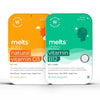If you are someone who has been fussing over a twitchy eye, constant fatigue, numbness in your hands and feet, poor memory, and loss of appetite, among other things, then you ought to get your vitamin B12 levels checked. Vitamin B12 is an important micronutrient that your body requires from time to time but cannot produce on its own. This is why you must consume foods or dietary supplements that are rich in this powerhouse nutrient. That said, let us try to understand in detail what vitamin B12 is and why it is important for the body.
What is Vitamin B12?
Also known as cobalamin, vitamin B12 is a water-soluble vitamin that plays an important role in keeping the body’s nerves and blood cells healthy. Additionally, it helps make DNA, which is the genetic material in all cells.

How much Vitamin B12 do You Require?
- Infants (0-6 months): 0.4 mcg
- Infants (7-12 months): 0.5 mcg
- Children (1-3 years): 0.9 mcg
- Children (4-8 years): 1.2 mcg
- Children (9-13 years): 1.8 mcg
- Teens (14-18 years): 2.4 mcg
- Adults (19 and older): 2.4 mcg
- Pregnant women: 2.6 mcg
- Breastfeeding women: 2.8 mcg
Signs of Vitamin B12 Deficiency
These are some signs that clearly point to a B12 deficiency. If you notice a couple or more of the below-mentioned signs, you should consider doing a blood test to figure out how deficient you are.
1. Fatigue or Weakness:
Vitamin B12 is essential for the production of healthy RBCs, which further help in the supply of oxygen (hemoglobin) for energy production. Hence, a deficiency might cause fatigue or weakness.
2. Tingling or Numbness:
A vitamin B12 deficiency can harm the myelin sheath that covers and protects nerves, resulting in tingling, numbness, or other neurological symptoms.
3. Cognitive Changes:
A lack of vitamin B12 can impair memory, concentration, and other cognitive functions.
4. Mood Swings:
Because vitamin B12 is involved in the creation of neurotransmitters that govern mood, a deficiency might result in depression, irritability, or other mood swings.
5. Digestive Issues:
Vitamin B12 plays a vital role in the survival of gut bacteria. More than 80% of gut bacteria require an external supply of vitamin B12 for their bodily functions. The rest of the gut bacteria are capable of producing it for their own use.
6. Pale or jaundiced Skin:
A shortage of vitamin B12 can induce a decrease in red blood cell formation, resulting in anemia. Pale or yellowish skin, weakness, and shortness of breath are all symptoms of anemia. Additionally, jaundice that persists for a long time may be a sign of vitamin B12 insufficiency caused by the inefficient production of red blood cells.
There are many ways in which vitamin B12 can benefit your health, from improving energy levels and boosting memory to reducing the risk of heart ailments. Let’s look at some of these benefits below.
Vitamin B12 Benefits
Many people wonder, "Is B12 important or not?" To answer that question, let us give you the benefits of this crucial vitamin:

1. Supports Red Blood Cell Formation:
Vitamin B12 is essential for the development of red blood cells, which transport oxygen throughout the body. Without adequate vitamin B12, red blood cells cannot form properly, resulting in megaloblastic anemia. Fatigue, weakness, and shortness of breath are symptoms of megaloblastic anemia.
2. Boosts Energy:
These healthy red blood cells later form hemoglobin in the presence of Iron. Hemoglobin is required for the transportation of oxygen to the site of energy production.
3. Supports Brain Function:
Vitamin B12 is required for the growth and maintenance of nerve cells. It aids in the production of myelin, a material that insulates nerve fibers and allows messages to move more efficiently via the neurological system. Low vitamin B12 levels can cause neurological issues such as memory loss, depression, and cognitive decline.
4. Improves Mood:
Vitamin B12 aids in the creation of neurotransmitters such as serotonin and dopamine, which are necessary for mood and emotion regulation.
5. Supports Bone Health:
Vitamin B12 collaborates with other vitamins and minerals, such as calcium and vitamin D, to keep bones healthy. It aids in the production of osteoblasts, which are cells that help generate new bone tissue. Low vitamin B12 levels have been linked to an increased risk of osteoporosis. Studies have shown that B12 deficiency is linked to the pathogenesis of bone degeneration.
6. Reduces the Risk of Birth Defects:
Adequate vitamin B12 levels are required for proper fetal development during pregnancy. Low levels of vitamin B12 during pregnancy have been associated with an increased risk of neural tube abnormalities in the developing embryo, such as spina bifida.
7. Supports Heart Health:
Vitamin B12 lowers homocysteine levels, which are a risk factor for cardiovascular disease. Homocysteine levels beyond a certain threshold have been linked to an increased risk of heart disease and stroke. Vitamin B12 supplementation may help lower this risk.
How to get Vitamin B12?

Wrapping Up
References:
- Vitamin B12 and Homocysteine Levels and 6-Year Change in Peripheral Nerve Function and Neurological Signs, Kira Leishear, Luigi Ferrucci, Fulvio Lauretani, Robert M. Boudreau, Stephanie A. Studenski, Caterina Rosano, Rosanna Abbate, Anna M. Gori, Anna M. Corsi, Angelo Di Iorio, Jack M. Guralnik, Stefania Bandinelli, Anne B. Newman, and Elsa S, The Journals of Gerontology Series A: Biological Sciences and Medical Sciences, 2012, doi: 10.1093/gerona/glr202, (https://www.ncbi.nlm.nih.gov/pmc/articles/PMC3326240/)
- Megaloblastic Anemia, Anis Hariz; Priyanka T. Bhattacharya, (https://www.ncbi.nlm.nih.gov/books/NBK537254/)
- Reversible hyperpigmentation of skin and nails with white hair due to vitamin B12 deficiency, N Noppakun, D Swasdikul, Archives of Dermatological Research, (https://pubmed.ncbi.nlm.nih.gov/3740873/)
- Maternal Vitamin B12 Status and Risk of Neural Tube Defects in a Population With High Neural Tube Defect Prevalence and No Folic Acid Fortification, Anne M. Molloy, PhD,a Peadar N. Kirke, FFPHMI,b James F. Troendle, PhD,c Helen Burke, BSocSc,b Marie Sutton, MB, MPH,b Lawrence C. Brody, PhD,d John M. Scott, ScD,e and James L. Mills, MD, MSc, Pediatrics Journal, 2009, doi: 10.1542/peds.2008-1173, (https://www.ncbi.nlm.nih.gov/pmc/articles/PMC4161975/)
- Vitamin B-12 status is associated with bone mineral content and bone mineral density in frail elderly women but not in men, Rosalie A M Dhonukshe-Rutten, Martine Lips, Nynke de Jong, Marijke J M Chin A Paw, Gerrit J Hiddink, Marijke van Dusseldorp, Lisette C P G M De Groot, Wija A van Staveren, Comparative Study Journal, 2003, (https://pubmed.ncbi.nlm.nih.gov/12612156/)
- Homocysteine and the risk of age-related macular degeneration: a systematic review and meta-analysis, Peirong Huang, Fenghua Wang, Birendra Kumar Sah, Junhai Jiang, Zhentian Ni, Jentso Wang, and Xiaodong Suna, Science Reports, 2015, doi: 10.1038/srep10585, (https://www.ncbi.nlm.nih.gov/pmc/articles/PMC4508850/)
- Vitamin B-12 concentration, memory performance, and hippocampal structure in patients with mild cognitive impairment, Theresa Köbe, A Veronica Witte, Ariane Schnelle, Ulrike Grittner, Valentina A Tesky 4, Johannes Pantel, Jan Philipp Schuchardt, Andreas Hahn, Jens Bohlken, Dan Rujescu, Agnes Flöel, Randomized Controlled Trial, 2016, doi: 10.3945/ajcn.115.116970, (https://pubmed.ncbi.nlm.nih.gov/26912492/)



























